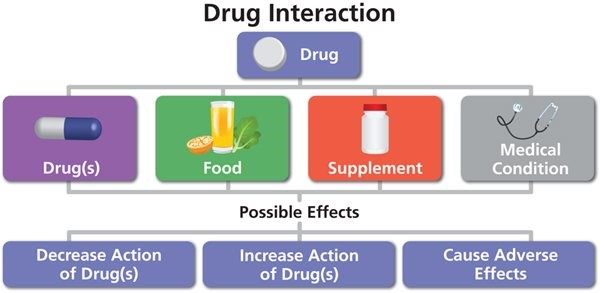What is a Drug Interaction?
Key Points
- A drug interaction is a reaction between two (or more) drugs or between a drug and a food, beverage, or supplement. Certain medical conditions can also cause a drug interaction.
- A drug interaction can affect how a drug works or cause unwanted side effects.
- Although treatment with HIV medicines can help people with HIV live long, healthy lives and reduce the risk of HIV transmission, drug interactions can complicate HIV treatment.
- Health care providers carefully consider potential drug interactions before recommending an HIV treatment regimen. Before taking HIV medicines, tell your health care provider about all prescription and nonprescription medicines, vitamins, nutritional supplements, and herbal products you are taking or plan to take.
What is a drug interaction?
Medicines help us feel better and stay healthy. However, sometimes drug interactions can cause problems. Drug interactions refer to reactions that affect how a drug acts in the body, which may change how effective or safe a drug is. There are three types of drug interactions:
- Drug–drug interaction: A reaction between two (or more) drugs, including both prescription and over-the-counter drugs.
- Drug–food interaction: A reaction between a drug and a food, beverage, or dietary supplement.
- Drug–condition interaction: A reaction that occurs when taking a drug while having a certain medical condition. For example, if you have high blood pressure, taking a nasal decongestant may increase your risk of stroke or heart attack.
A drug interaction can affect drug activity levels or cause adverse events. People with HIV should be aware of potential drug interactions to make sure their HIV medicines work safely and effectively.

Do HIV medicines ever cause drug interactions?
Treatment with HIV medicines (called antiretroviral therapy or ART) helps people with HIV live long, healthy lives and reduces the risk of HIV transmission. However, drug interactions, especially drug–drug interactions, can complicate HIV treatment.
Drug–drug interactions commonly occur between different HIV medicines and between HIV medicines and other medicines. Before recommending an HIV treatment regimen, health care providers carefully consider potential drug–drug interactions between HIV medicines.
In addition, health care providers should also ask about other medicines a person may be taking. For example, some HIV medicines may make hormonal birth control less effective, so women using hormonal contraceptives may need to use an additional or different method of birth control to prevent pregnancy.
For more information about using birth control and HIV medicines at the same time, view the HIV and Birth Control infographic from HIVinfo.
While rare, some drug interactions can have more serious side effects. For example, some interactions can reduce kidney function, damage the liver, or cause changes to your heartbeat. These interactions can be prevented by talking to your health care provider about any medicines and supplements you take or plan to take.
Can drug-food interactions and drug-condition interactions affect people taking HIV medicines?
Yes, the use of HIV medicines can lead to both drug–food interactions and drug–condition interactions.
Both the amount and type of food (or supplement) can affect the absorption of some HIV medicines and increase or reduce the concentration of the medicine in the blood. Depending on the HIV medicine, the change in concentration may be helpful or harmful.
Some HIV medicines (such as rilpivirine) should be taken with food, while others (such as efavirenz) should be taken on an empty stomach. In addition, supplements with iron, calcium, and magnesium can affect some medicines in the integrase strand transfer inhibitor drug class.
Directions on how to take HIV medicines specify whether to take the medicine with food or on an empty stomach. Some HIV medicines (such as dolutegravir) can be taken with or without food because food does not affect their absorption.
Conditions, such as kidney disease, hepatitis, and pregnancy, can affect how the body processes HIV medicines. The dosing of some HIV medicines may need to be adjusted in people with certain medical conditions.
How can a person avoid drug interactions?
You can take the following steps to avoid drug interactions:
- Tell your health care provider about all prescription and nonprescription medicines you are taking or plan to take. Also tell your health care provider about any vitamins, nutritional supplements, and herbal products you take.
- Tell your health care provider about any other conditions you may have, such as high blood pressure or diabetes.
- Before taking a medicine, ask your health care provider or pharmacist the following questions:
- What is the medicine used for?
- How should I take the medicine?
- While taking the medicine, should I avoid any other medicines or certain foods or beverages?
- Can I take this medicine safely with the other medicines that I am taking? Are there any possible drug interactions I should know about? What are the signs of those drug interactions?
- In the case of a drug interaction, what should I do?
- Take medicines according to your health care provider's instructions. Always read the information and directions that come with an HIV medicine. Drug labels and package inserts include important information about possible drug interactions.
If you believe you are experiencing a drug interaction of any type, be sure to contact your health care provider. Never stop taking an HIV medicine without talking to your health care provider.
This fact sheet is based on information from the following sources:
From the HIV Clinical Practice Guidelines at Clinicalinfo.HIV.gov:
- Guidelines for the Use of Antiretroviral Agents in Adults and Adolescents With HIV:
- Drug–Drug interactions
- Considerations for Antiretroviral Use in Special Populations: HIV and the Older Person and Women With HIV
From the U.S. Food and Drug Administration:
From the National Institute on Aging:
Also see the HIV Source collection of HIV links and resources.
